By Reporter Anna Kim
South Korea and Pakistan are celebrating the 40th anniversary of the establishment of diplomatic relations in 2023. However, it is a reality that bilateral exchanges between the two countries have been rather limited despite the excellent relations.
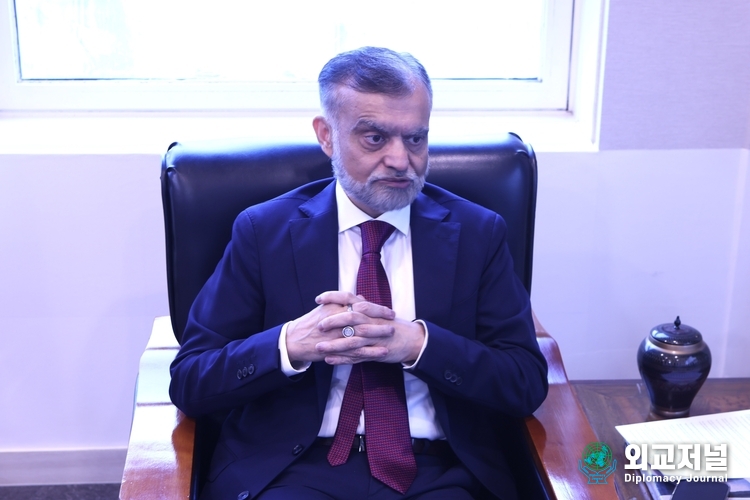
With a distinguished background as a veteran diplomat who served at the United Nations, the appointment of Nabeel Munir as the Pakistani Ambassador to South Korea is seen as a highly positive step, and it is expected to further strengthen the friendly relations between the two nations.
From the 5th century BC to the 2nd century AD, Pakistan was a renowned center of Buddhism, arts, philosophy, religion, and culture. The country holds many significant archaeological sites, including the unique ruins of Taxila, which was designated as a UNESCO World Heritage site in 1980. The Diplomacy Journal is excited to have an interview with Ambassador Nabeel Munir about the future vision for enhancing relations between the two countries.
The following is the full text of the interview with Ambassador Nabeel Munir of Pakistan to South Korea.
Question: What are the areas in your country where you want Korean companies to invest and what are the areas where you wish your businessmen to invest in Korea?
Answer: For Pakistan, most investments are from Korea to Pakistan, with very few the other way around.
Korea is a strong economy, and if there are Pakistani investors that want to invest in Korea, the potential is huge.
It would, of course, be up to the investors themselves to decide where they can get best returns for their investment. But the one obvious area that comes to mind is IT. It is booming sector in Korea, and it is a sector in which Pakistani young professionals have a lot of expertise as well.
Q: What are your products and services attractive to Korea / What are the Korean products and services that your country might wish to import?
A: The volume of bilateral trade between Pakistan the ROK currently stands at around US$ 1.7 billion. There is however, still a lot of scope for further enhancement.
From Pakistan, IT products and services, agricultural products, textiles, surgical and sports goods, etc. are available at competitive prices. Many Koreans may not know, but the soccer balls used in many of the recent soccer world cups are made in Pakistan. So the quality of our products is absolutely world class. Pakistani mangoes are one of the best in the world. And we have started exporting these delicious mangoes to the ROK just this week. Hope the Korean people will soon fall in love with this sweet aromatic delight form Pakistan.
From Korea, electronics, automobiles and parts, heavy machinery etc. are some of the principal exports to Pakistan.
Q: Who are the major Korean companies actively engaged in bilateral economic cooperation between the two countries?
A: Quite a few Korean companies are working in Pakistan, and are contributing to both the socio economic development of Pakistan and the Korean economy. Daewoo, for instance, constructed the first motorway in South Asia in Pakistan, in the 1990s. Samsung and Lotte are there. KOEN(Korea South-East Power Co), K-water and KHNP(Korea Hydro & Nuclear Power Co. Ltd) have invested in hydroelectric power. KIA, last year, achieved the status of becoming the third largest in car sales in Pakistan.
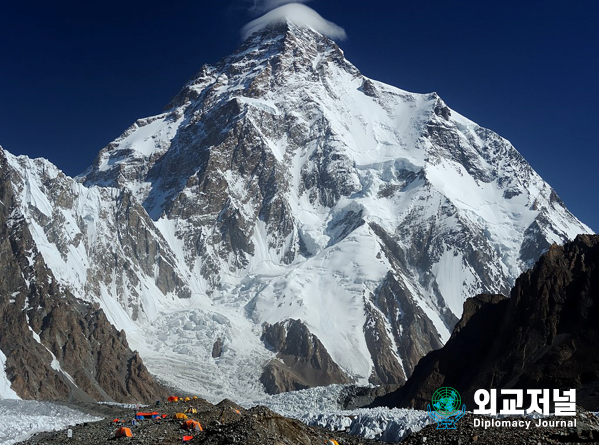
Q: Korean people, especially the up-and-coming Korean businessmen need rest and recuperation. What are your tourist attractions?
A: Pakistan is a very diverse country. We have tourist attractions that can cater for all kinds of interests. For the adventure tourists, we have very high mountains. Five of the top 14 mountains in the world (that are over 8000 meters high) are in Pakistan. K-2, the second highest mountain, is also in Pakistan. Then we also have smaller peaks for amateur hikers. They can also enjoy white water rafting and other adventures.
For the nature lover, Pakistan offers have beautiful pristine green valleys. Then we also have a rich tradition of religious and cultural tourism. So, if you want to go for cultural tourism, I think the best place would be Lahore. If you want to go for mountains, you have to go to the North. We also have beautiful beaches and deserts in the south of the country.
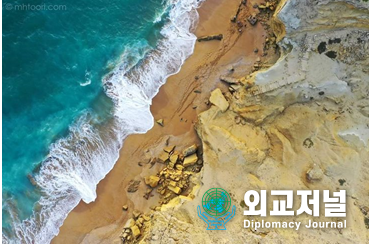
For religious tourism, we have Buddhist, Sikh and Hindu religion’s sacred sites. We have Taxila, Harappa and Moenjodaro, where relics of civilizations that existed thousands of years ago are preserved.
Monk Maranantha, who brought Buddhism to Korea almost 1600 years ago, came from Pakistan. And many of those monasteries are also very well preserved.
For the food lovers, Pakistan also offers a very unique blend of South Asian, Central Asian, Persian and Middle Eastern cuisine.
Q: What are the most important festive days in your country? Please elaborate.
A: We have two big religious festivals which are called Eids. The Eid ul Fitr is celebrated at the end of the Ramadan, the Muslim fasting month. The Eid ul Azha is a celebration of sacrifice.
There are also many other festivals. For example, there is the Shandhur festival, which was just held last week. It is held in the Northern Mountains of Pakistan. The festival celebrates the local culture and the game of polo. It is here that the game of polo started many centuries ago. Polo is a kind of hockey that you play on horseback. The festival is held at the height of almost 13,000 feet, during summer.
In addition to these, Pakistan has a wide variety of other festivals as well.
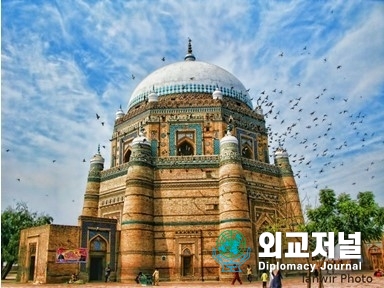
Q: Please introduce events planned by the Embassy this year.
A: One of our annual events is the National Day reception which is on 23rd March. We had a big reception in Seoul for our National Day earlier this year.
We have also community events for Independence Day which is on 14th August.
In addition to that, we mark the 40 years of establishment diplomatic relations between Pakistan and ROK this year. We are organizing a number of events this year to commemorate that. For instance, we will have a concert with Pakistani singers on 11th August at the National Museum of Korea, and another musical event on 13th August.
We are hosting a Pakistan Trade and Investment Conference in July in Seoul. Korean and Pakistani businesses and prospective investors will attend.
With the Pakistan Students and Scholars Association of Korea, we are planning another music concert in September. It will also include a fashion show. Pakistani and K-Pop bands will be performing at the concert.
Pakistan is the feature country at the Migrants’ Arirang Multicultural Festival (MAMF) in Changwon this year. Artists and musicians from Pakistan will be coming for the event. Festival goers will also be able to get a taste of Pakistani culture, arts and crafts and cuisine.
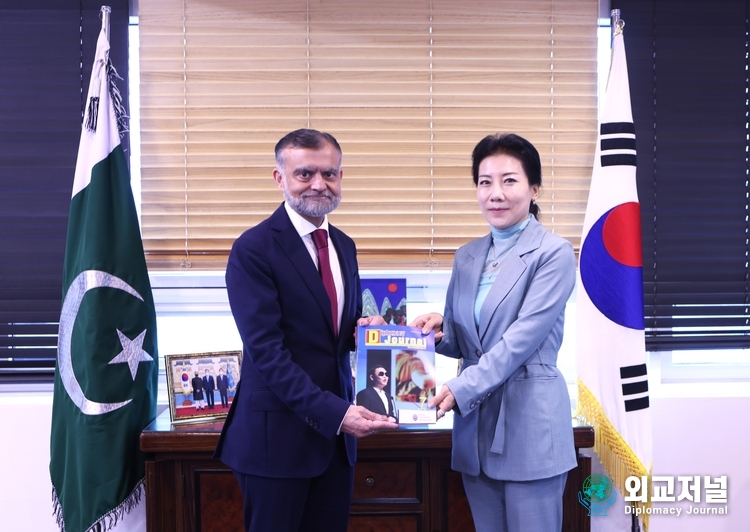
Q: How do you see progress on economic and people to people contacts between Pakistan and Korea?
A: We have a number of Pakistani workers working in Korean factories, contributing to the economic development of Korea. Additionally, we have Pakistani businessmen doing business in diverse fields. A number of Pakistani students are studying and doing research in major Korean Universities. Sookmyung Women's University has recently signed an MOU with Fatima Jinnah Women's University in Pakistan. They will initiate a student exchange program.
The ROK also provides development cooperation support under its Economic Development Cooperation Fund. The Exim Bank of Korea disburses this through different development projects in the country. The focus this year has been on infrastructure damaged by the devastating floods in the country last year.
Q: What would be your focus of work during your stay in Korea ?
A: I have three priorities that I want to work on. First is further enhancement of trade and investment between two countries. For that, one of things that we are doing, as I told you as earlier, is holding a Trade and Investment Conference. We are expecting Korean government to participate in it as well. We are hoping that the Minister of MOTIE will attend. Now that COVID related restrictions have ended, bilateral economic cooperation can resume fully, and the Conference would be a step in that direction.
The second thing that I am working on is enhancing people to people contacts. I feel it can serve as a spur for increasing cooperation in other areas. Tourists, businesses, students, all help in achieving this objective. Partnerships between Universities, cultural exchanges and conferences are all part of that endeavour.
The third thing that I am working on is high level exchanges. We want to see if it is possible to have Foreign Minister level meetings during this year as part of the 40th anniversary celebrations.







